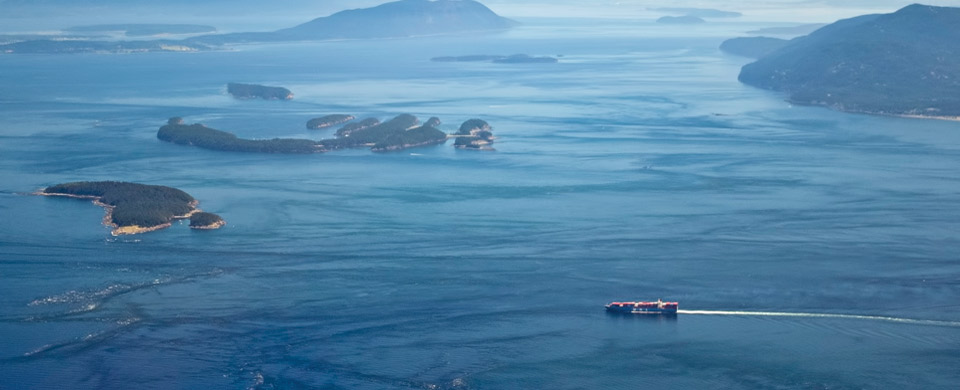– by Chris Genovali –
Straddling two countries, the Salish Sea is one of the world’s largest inland seas. Weaving through an archipelago containing hundreds of islands, the mixing of large freshwater rivers with marine waters in basins, bays and straits has created an ocean rich with life that is surrounded by outstanding natural beauty. It is also a desirable place for fossil fuel exporters to link together their numerous proposals to ship non-renewable, and typically dangerous, hydrocarbons to foreign markets.
One of these proposals is Kinder Morgan’s Trans Mountain expansion, which would effectively triple their existing pipeline output from current levels to 890,000 barrels of tar sands oil per day. The consequent increase in oil tanker traffic would result in more than 400 tankers travelling the Salish Sea every year – a 500% increase from 2010. However, this figure might be an underestimate: increases in pump capacity could deliver more than one million barrels per day, requiring up to 475 tankers every year.
There are many risks associated with the Kinder Morgan proposal that could impact people and wildlife locally, regionally and globally. These effects range from the pollution, habitat and wildlife destruction in the tar sands, to the acceleration of global climate change, to the potential for oil spills throughout the Salish Sea region’s land, rivers and oceans.
In an attempt to predict the behaviour of oil from a potential spill in the Salish Sea, and to alert coastal residents of that very real possibility, Raincoast has launched a study to map the potential spread of an oil spill along the Kinder Morgan tanker route. Together with the Georgia Strait Alliance, we have dropped almost 2,500 drift cards (small squares of plywood) along the tanker route through the Salish Sea. Public participation in reporting these cards at www.salishseaspillmap.org helps us produce maps of potential oil spill trajectories.
One of Raincoast’s biggest concerns regarding the increased vessel traffic and potential oil spill risk is for B.C.’s iconic southern resident killer whales, whose critical habitat is routinely travelled by freighters, bulk carriers, and increasingly, oil tankers. Numbering only 81 individuals, this highly-endangered population of whales faces many threats, including shortages of Chinook salmon, noise and disturbance from vessels, and exposure to big and small oil spills. For these whales to survive it is imperative that we reduce – not increase – the risks from shipping and oil spills in the Salish Sea.
Raincoast’s strategy with Kinder Morgan is to apply our mandate – investigate, inform, and inspire. As such, we are acting as interveners in the National Energy Board review of the Trans Mountain expansion and will present evidence concerning the risk and impacts of oil tankers on salmon, herring, killer whales and coastal habitats throughout the Gulf Islands and along the tanker route.
Chris Genovali is the Executive Director of Raincoast Conservation Foundation. For more information visit www.raincoast.org. Photo by Evan Leeson.




